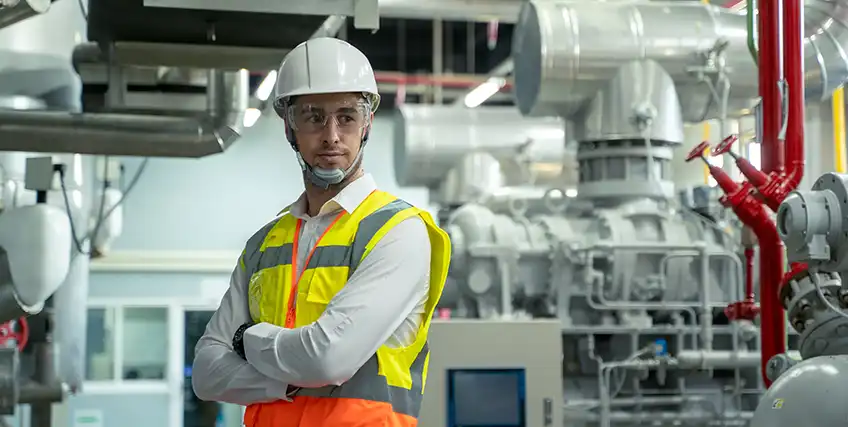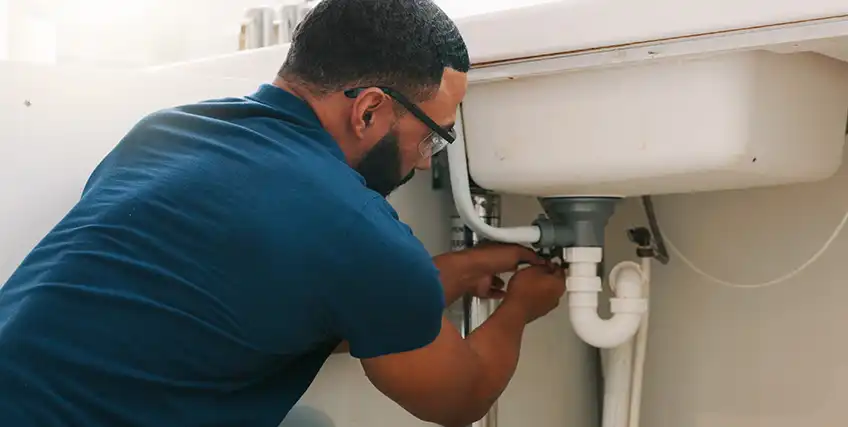Ways to Purchase an HVAC Company
April 04, 2025 | Last Updated on: April 04, 2025

The HVAC industry plays a crucial role in American life, providing essential heating, ventilation, and air conditioning services to residential and commercial properties. While demand for these services is high, HVAC businesses often face challenges like seasonal fluctuations, high upfront costs for a new HVAC system, and competition. This makes securing reliable financing essential, particularly from reputable HVAC loan companies. Financing options help entrepreneurs overcome initial cost barriers when they decide to buy into a business or buy a HVAC business from scratch. Securing adequate funding is critical for covering initial expenses, equipment costs, and operating capital in the HVAC industry. With multiple financing solutions available, buying an HVAC business can become an achievable goal for entrepreneurs looking to buy a small business.
Understanding the HVAC Industry
The HVAC industry has witnessed consistent growth driven by increased demand for energy-efficient HVAC systems, government incentives, and rising real estate developments. Those looking to buy an HVAC business must understand the industry's seasonal nature and labor requirements. Technicians' availability and training directly impact business success. Prospective business owners should consider market saturation, competition, and reputation within local markets. Utilizing services from reputable HVAC loan companies can streamline financing, allowing buyers to invest strategically. Additionally, evaluating the potential for ongoing maintenance contracts can provide steady revenue, offsetting slower seasons. Understanding these dynamics helps entrepreneurs effectively start HVAC businesses or buy into existing ventures.
How Do You Value an HVAC Business Opportunity?
Determining the value of an HVAC business involves several key factors. Potential buyers should examine financial statements, existing customer contracts, equipment conditions, and employee retention rates. The cash flow, profitability, and historical performance data are crucial indicators of value. Conducting a thorough market analysis, including competitor assessments, helps gauge future profitability. Financing from HVAC loan companies can assist buyers in meeting valuation expectations. It's essential to review debt obligations, inventory quality, and pending liabilities thoroughly. Proper due diligence minimizes risk, ensuring a profitable purchase. Working with financial advisors experienced in HVAC businesses can further clarify valuation specifics, enabling informed decisions when choosing to buy a small business.
How to Purchase an HVAC Company
SBA Loans
Small Business Administration (SBA) loans are popular financing options for those looking to buy an HVAC business. SBA loans offer attractive interest rates and extended repayment terms, making them suitable for substantial investments. They typically require borrowers to have a solid credit score, stable financial history, and adequate collateral. SBA loans, provided through authorized HVAC loan companies, help prospective business owners navigate complex application processes. These loans can cover significant portions of the purchase cost, equipment investments, or working capital needed to operate effectively in the competitive HVAC industry. AsSBA loans are government-backed, they reduce risk for both buyers and lenders, providing reliable funding to start an HVAC business or expand existing operations confidently.
Seller Financing
Seller financing is ideal for entrepreneurs looking to buy a small business with limited upfront funds. In this method, the existing HVAC company owner agrees to finance part of the sale price directly to the buyer. It offers flexibility, allowing for tailored monthly payments aligned with the business's revenue and buyer's financial capabilities. Often, seller financing complements other funding sources, such as loans from specialized HVAC loan companies, providing a balanced financial structure. This approach reduces initial financial pressure and allows buyers to invest strategically in necessary HVAC units, employee training, and marketing. Seller financing can significantly ease the transition period, ensuring business continuity and stability throughout the ownership change.
Bank Loans
Bank loans remain a trusted financing solution for acquiring an HVAC business, offering structured and predictable repayment terms and competitive interest rates. To qualify for a bank loan, buyers typically require strong credit scores, detailed financial statements, and sufficient collateral. Bank loans can fund significant portions of the business purchase, including real estate associated with the HVAC operation, critical equipment such as air conditioning systems, and working capital. Partnering with experienced HVAC loan companies can streamline the rigorous approval process, assisting buyers through extensive credit checks and comprehensive documentation requirements. Bank loans provide buyers with a reliable financial foundation for sustained business success.
Equipment Financing
Equipment financing specifically addresses the substantial costs of purchasing essential assets like HVAC systems, cooling systems, heat pumps, and related tools. With this financing type, buyers can directly secure funds for equipment without significant upfront capital. It usually features competitive interest rates, tax incentives, and manageable monthly payments. Working with specialized HVAC loan companies simplifies the process, providing tailored solutions based on individual business needs and financial situations. Equipment financing enables buyers to invest in advanced, energy-efficient HVAC systems, ensuring long-term cost savings and compliance with environmental standards. By reducing immediate financial burdens, equipment financing supports stable growth and operational efficiency from the outset.
Personal Loans
Personal loans offer buyers quick and convenient financing to address immediate or smaller-scale expenses when acquiring an HVAC business. These loans have simple application processes and fast approval times, making them attractive for buyers needing rapid access to funds. However, they usually have higher interest rates than traditional business loans. Entrepreneurs should carefully assess their financial capability and align repayment terms provided by reputable HVAC loan companies with their business projections. Personal loans can help cover preliminary expenses like initial deposits, equipment down payments, or emergency costs, ensuring the smooth transition of business ownership and uninterrupted business operations.
Lines of Credit
Business lines of credit offer valuable flexibility, essential for managing seasonal fluctuations and ongoing operational expenses inherent in the HVAC industry. A credit line allows entrepreneurs to borrow funds as needed, repay, and borrow again, making it ideal for handling variable cash flow demands such as payroll, emergency equipment repairs, or purchasing inventory. Working with reputable HVAC loan companies offering flexible and competitive terms ensures continuous access to funds without overburdening the business financially. Credit lines help entrepreneurs strategically manage cash flows, address short-term liquidity gaps effectively, and maintain seamless business operations, particularly valuable for new business owners who have recently decided to buy into a business or start an HVAC business from scratch.
Credit Cards
Best for short-term expenses or immediate needs, credit cards offer convenience and rewards. However, managing balances is crucial to avoid high-interest payments and ensure financial stability.
Conclusion
Purchasing an HVAC business can be highly profitable when approached correctly. Understanding market dynamics, accurately valuing the business, and selecting appropriate financing are critical steps. HVAC loan companies offer various financing solutions, enabling buyers to start HVAC businesses or acquire established operations efficiently. Whether through SBA loans, seller financing, or traditional bank loans, options abound for entrepreneurs. Ensuring careful financial planning, due diligence, and a clear understanding of repayment terms helps small business owners secure profitable and sustainable HVAC companies.
FAQs
What factors should I consider before choosing HVAC loan companies?
Before choosing HVAC loan companies, evaluate their interest rates, repayment terms, loan flexibility, and customer reviews. Also, consider your business requirements, credit score, and financial health. It's important to compare various loan providers to identify the most suitable financing options, ensuring they align with your business goals and operational needs. Checking eligibility requirements and understanding potential penalties or hidden fees will help you make an informed decision and secure advantageous financing terms to buy an HVAC business.
Can I secure financing from HVAC loan companies if I have bad credit?
Several HVAC loan companies offer financing solutions even if your credit score is less than ideal. However, loans for individuals with bad credit usually come with higher interest rates, stricter repayment conditions, and possibly smaller loan amounts. It’s crucial to carefully evaluate your financial capabilities and repayment plan. Improving your credit score can help you qualify for better loan terms, reducing the overall cost of financing your HVAC business purchase and providing financial stability in the long term.
How do HVAC loan companies assess my eligibility for financing?
HVAC loan companies assess eligibility based on various factors, including your credit score, credit history, annual revenue, collateral value, and business profitability. They might also evaluate your business plan, market potential, and management experience. Preparing detailed financial statements, tax returns, and a clear business projection can significantly increase your chances of securing favorable loan terms. Ensuring transparency in documentation and demonstrating strong financial health will make it easier to obtain financing for your HVAC business.
What documents will HVAC loan companies require for the loan application process?
HVAC loan companies typically require several key documents, including personal and business tax returns, credit reports, financial statements, profit and loss statements, bank statements, and business licenses. Additionally, proof of collateral, detailed business plans, and legal documentation such as purchase agreements or lease contracts might be necessary. Thoroughly preparing these documents in advance streamlines the application process, facilitates faster approvals, and increases your chances of obtaining favorable loan terms for your HVAC business acquisition.
How quickly can I expect financing approval from HVAC loan companies?
Approval times from HVAC loan companies typically vary depending on the type of financing you apply for and the thoroughness of your application. Standard bank loans and SBA loans may take several weeks due to extensive documentation requirements. Equipment financing and lines of credit generally have quicker approval timelines, sometimes within a few business days. To speed up the process, ensure your documentation is complete and accurate, and maintain clear communication with your lender throughout the application process.




